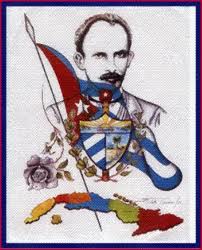Quién tiene un enemigo... ¿tiene un tesoro?
(In english below)
Hace unos días cayó en mis manos la siguiente cita: “Triste es no tener amigos, pero más triste debe ser no tener enemigos, porque, el que enemigos no tenga, señal es que no tiene: ni talento que haga sombra, ni carácter que impresione, ni valor temido, ni honra de la que murmuren, ni bienes que se codicien, ni cosa buena que se envidie”. Ahí es nada.
Pues bien. ¿Sabe usted de quién es esta perla? Pues de José Martí, el poeta - guerrero padre de la independencia cubana. Cuando la leí, le confieso que me asusté. Pero después me di cuenta que en ella estaba, en esencia, el tema de la tribuna de hoy: de cómo es imposible (o casi) crecer por las organizaciones sin dejar algún enemigo a la espalda, sin contabilizar bajas en tus relaciones personales y profesionales, sin poder concertar el aplauso de todos, y sin ser profeta en tu tierra.
Quizás algunos de ustedes hayan pasado más de una noche sin dormir por no querer asumir esta miserable realidad. Pues bien. Si todavía está usted convencido de que no tiene enemigos, permítame ofrecerle unas ideas para que, si posible, no se deprima cuando descubra tras el rincón del pasillo la cara de ese rival declarado que usted nunca tuvo por tal.
En primer lugar, y quizá le cueste asimilarlo, asuma desde este momento que, por el mero hecho de que las cosas le vayan bien, o le puedan ir bien en un futuro, ya tiene una pequeña nómina de enemigos. Sepa desde ya, que eso es así, que siempre es así, que siempre será así… aún cuando íntimamente tenga la conciencia bien tranquila de no haber declarado batalla alguna contra nadie y de no haber actuado de mala fe contra nadie.
Las causas de estas inquinas pueden ser tan dispares como seres humanos haya. Por una parte, José Martí, con una precisión infinita, sacó a pasear la envidia como la causa de todas las miserias; la envidia hacia el talento, hacia el carácter, hacia el valor, hacia la honra, hacia los bienes o hacia cualquier otra cosa buena que pudiera tenerse. Por otra, y es una opinión personal, creo que la inseguridad personal, la baja autoestima en uno mismo, o el propio reconocimiento de inferioridad es otro buen argumento para aumentar la nómina de enemigos. En este punto, podríamos poner miles de ejemplos (Mozart con Salieri), pero tampoco es necesario. Simplemente convenga conmigo que, por lo general, con la gente inteligente, con criterio y con cosas que aportar, es bastante difícil tener una relación de inquina; podrán tener divergencias, mayores o menores, pero, al final, con ellos es fácil perfilar y definir los problemas y, en su caso, llegar a acuerdos en lo que sume para todos.
En segundo lugar, ypor mucho que intente rebelarse contra ello, sepa usted que, “hacer las paces” con determinadas personas es una batalla perdida de antemano. Es curioso, pero, cuanto más intente convencer a alguien de que usted no le hizo nada; cuantos mayores sean sus esfuerzos por agradar; cuantas más manos tienda para arreglar la situación… peor se pondrán las cosas. No me pregunte por qué pero ese suele ser un dato empírico. Quizá sea porque una actitud así de su parte agigante la envidia e incremente la sensación de inseguridad del enemigo. Por ello, créame: no gaste sus energías en tratar de arreglar las cosas con determinados individuos.
Así pues, si esta es la realidad (y lo pongo en condicional para no ser dogmático ni, sobre todo, cenizo) … ¿qué podemos hacer? Para empezar, creo que el mero hecho de reconocer que los establos huelen a estiércol, ya es un buen avance; por lo menos, que no le pille de sorpresa las cosas que pasan.
Otra gran terapia contra el enemigo es, curiosamente, tenerle cerca. Sí; lo que oye: tenerle cerca. Hay gente que cree que el enemigo, lo más lejos, lo mejor. Sin embargo, piense una cosa: ¿acaso no es más fácil anticipar los movimientos de alguien que tienes junto a ti, que intuir los ataques de alguien a quien no puedes ver?. Si no me cree, sólo tiene que darse cuenta de que el mundo era más seguro antes que ahora. Antes había un gran enemigo, institucionalizado y oficializado. Hoy nadie sabe de dónde pueden venirle los problemas. Por tanto, no renuncie nunca a tener vías de diálogo abiertas, en directo, o por terceros, con los que se declaren como enemigos suyos.
Dejar pasar el tiempo, adormecer el conflicto, o, en términos deportivos, enfriar el partido también me parece bastante inteligente. Como dice el refrán, el tiempo da y quita razones y, además (ya lo dijo Cela), normalmente “gana el que aguanta”. Hace años tuve un Consejero Delegado, (del que guardo un gratísimo recuerdo), que siempre decía que “el llanto, sobre el difunto”; aquella expresión la usaba para remarcar la necesidad de actuar en caliente, antes que se olvidasen las cosas; creo que hoy, con el paso del tiempo, no aplicaría esta máxima en las relaciones con mis enemigos.
Y, para terminar, la ignorancia o la indiferencia es otra buena receta para combatir enemigos. No “entre al trapo”, en términos taurinos; no se enganche en peleas menores; piense que los excesos de sus enemigos debieran ser para usted “como zumbidos de moscas en sus oídos”. La frase no es mía, es de Mika Waltary en su famosa novela Sinuhé el Egipcio.
Pues ahí van mis reflexiones sobre la existencia del enemigo. Dice el refrán que “quien tiene un amigo, tiene un tesoro”. Pero, a lo mejor, va a resultar que lo de tener un buen enemigo tampoco va a ser mala cosa. Decía un amigo mio que un “buen enemigo te dignifica”. A lo mejor te hace más fuerte ante los demás, más dialogante, más frío y más reflexivo. Y, además, perdónelos. Oscar Wilde decía: “Perdona siempre a tus enemigos. NO hay nada que les haga enfadar tanto”.
Publicado en el Diario Cinco Días, 29 de noviembre de 2002
In english
Whoever has an enemy… has something to treasure?
A few days ago I stumbled upon the following quotation: “It is sad to have no friends, but it is worse to have no enemies, because if a person has no enemies it is likely that they have: no talent that overshadows others, a personality that leaves no impression, no value to be feared, they are not worth gossiping about, have no belongings worth coveting, nor anything good that causes jealousy.” They are nothing.
There we are. Do you know who said that phrase? It’s by José Martí, the poet and father of Cuban independence. When I read it, I admit I was alarmed. But later I realised that it contained, in essence, today’s topic: how it is impossible (or very nearly) to grow within organisations without leaving one or two enemies behind, without recording losses in your personal or professional relations, not being able to gain everybody’s approval, without being sometimes overlooked or unappreciated.
Maybe some of you have had more than one sleepless night because of an inability to accept this sad reality. Well ok. If you are still convinced that you have no enemies, allow me to offer you some ideas so that, if possible, you can avoid being too upset when you discover hidden in a corner of the office the face of a bitter rival whom you never considered as such.
In the first place, and maybe it is difficult to accept, assume that from this moment, because of the mere fact that things are going well for you, or that they could in the future, you already have a small number of enemies. Know from now that this is how it is, and it will always be that way… even if you are completely at peace and secure in the knowledge that you have nothing against, and have not done anything to wrong, anyone.
The causes of these grudges can be as diverse as people themselves. On one hand, José Martí, with infinite precision, pointed to envy as the cause of all grievances; envy of talent, personality, of worth, of honour, of possessions or of anything else a person could have. Another reason could be personal opinion, I think personal insecurity, low self-esteem or a recognition of inferiority is another good way to increase the list of enemies. In this regard we could list thousands of examples (Mozart and Salieri), but it is not necessary. You must agree with me that, in general, with intelligent people and with a bit of discretion and something to share, it’s quite difficult to have a bad relationship: there may be differences but, in the end, it’s quite easy to describe and define the problems and, if there are, to reach agreements that benefit everyone.
Secondly, and however much you wish it weren’t so, “making peace” with some people is just a waste of time, the battle is lost before it has begun. It is strange, but, the more you attempt to convince someone that you haven’t done anything; the more you try to be nice; the more you do to fix things… the worse it is. I don’t know why, but this is usually true. Maybe because that attitude on your part stirs up more envy and augments the insecurity of the enemy. That’s why I believe that you shouldn’t waste your energy trying to fix things with some people.
So if that is the reality (and I say “if” so that I am neither inflexible nor overly pessimistic)… what can be done? To start with, I think that recognizing that the stables smell of manure is a good first step; at least we won’t be taken by surprise if something happens.
Another good way to inoculate yourself against the enemy is, strangely, to keep them close. Yes, you read that right: keep them close. There are some people who think that the farther away an enemy is the better. However, remember one thing: is it not easier to predict the actions of someone next to you, than try to guess the movements of someone you cannot see? If you don’t believe me, you only have to realise that the world was safer before than it is now. Before, there was a great enemy, institutionalised and official. Now, nobody knows where the problems can come from. Therefore, you should never close off ways for dialogue, directly or through third parties, with those who are your enemies.
Let time pass, put the conflict to bed, or, in sporting parlance, calm the game down also seem quite intelligent. As the saying goes, time heals everything, and additionally (as Cela said), usually “the person who lasts the longest, wins”. Years ago I had a Managing Director, (of whom I have good memories), who always spoke of “mourning the dead”, meaning that it was better to strike while the iron is hot and before it is too late, when things are still fresh in the memory. I think that now, with the passage of time, I wouldn’t apply that piece of advice when it comes to my enemies.
To finish, indifference or ignoring them is another good way to combat your enemies. Don’t “fall in the trap”, don’t get involved in small fights; remember that the excesses of your enemies should be like “the buzzing of flies” as Mika Waltari put it in his book The Egyptian.
And there you have my thoughts on the existence of enemies. As the saying goes “whoever has a friend has something to treasure”. But, maybe, having a good enemy is not such a bad thing. A friend of mine said “a good enemy dignifies you”. Maybe it makes you stronger when facing others, a better speaker, colder and more thoughtful. And, in addition, forgive them. Oscar Wilde put it well saying: “Always forgive your enemies. There is nothing that annoys them more.”
Published in the daily paper “Diario 5 Días” November 29th, 2002








